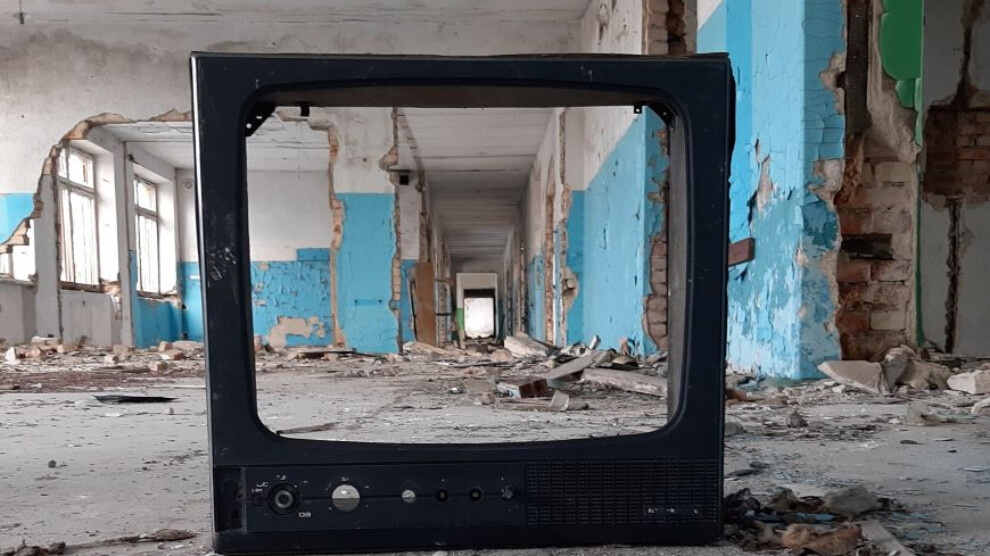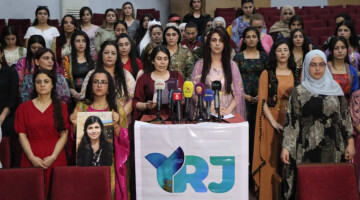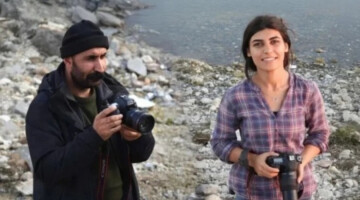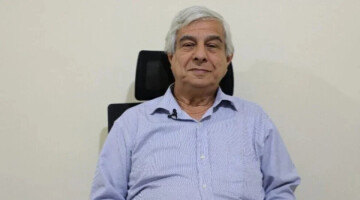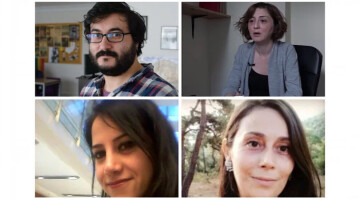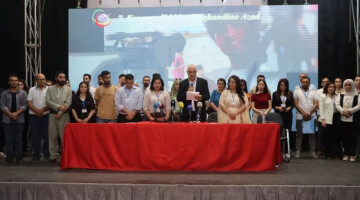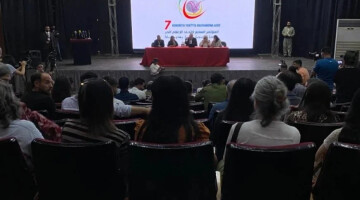In 2022, since Russia launched its war of aggression against Ukraine, at least 12 journalists and media workers were killed and 21 injured while performing their professional duties. The war occurred in a context of continued degradation of press freedom across Europe, with a significant increase in the number of journalists in detention, according to the 2023 annual report of the partner organisations of the Council of Europe’s Platform to promote the protection of journalism and safety of journalists.
Released under the title “War in Europe and the fight for the right to report”, the report examines the main threats to media freedom in Europe and addresses recommendations to the Council of Europe, the European Union and their member states on actions needed to improve the situation. During 2022, the platform published 289 alerts on serious threats or attacks on media freedom across 37 states, with journalists being murdered, imprisoned, attacked, legally harassed and subjected to smear campaigns.
According to the report, arbitrary arrest and detention of journalists have become commonplace in Europe. As of 31 December 2022, 95 journalists were reported on the Platform in detention, including 52 in Turkey, 22 in Russia, 14 in the Russian-occupied territories of Ukraine, four in Azerbaijan, one in the United Kingdom, one in Georgia and one in Poland. This represents an increase of 60% compared to 2021.
Regarding Turkey, the report highlights the media authorities' punitive measures against independent media outlets, the "disinformation law" adopted in October, and court cases against and imprisonment of journalists.
The report also cites the 2022 Media Pluralism report published by the Centre for Media Pluralism and Media Freedom164, which found that Turkey was among the five countries that have the highest concentration of media in Europe.
The 2022 Media Pluralism Monitor, published by the Centre for Media Pluralism and Media Freedom164, identified eleven of 32 European countries where media pluralism is at 'high risk', and 28 or 32 countries where news media concentration is also at high risk. Turkey, Albania, Poland, Hungary and Bulgaria have the highest concentration of media in Europe.
The report's findings about Turkey include the following:
"On 13 October, the Grand National Assembly of Turkey adopted a bill aimed at combating disinformation, consisting of some 40 articles amending the Internet Law, the Press Law, and the Turkish Penal Code. Entered into force on 18 October, the law now punishes with one to three years in prison anyone found guilty of "deliberately publishing disinformation and false information" intended to arouse fear or cause panic, to endanger the country's internal or external security, public order and the health of Turkish society. These penalties can be doubled in case of publication from an anonymous account, by a person hiding his/her identity, or by any other person acting on behalf of a criminal organization. The law also expands restrictions on social media first passed in 2020, making it easier for the Turkish authorities to remove content from the internet. It also scaled up the powers against social media platforms to force them to remove content or face massive fines (up to 3% of global revenue), advertising bans and bandwidth throttling."
Under article 299 of the Turkish Penal Code, the crime of insulting the president carries a jail sentence of one to four years. On 11 March, prominent journalist Sedef Kabaş146 received a two-year and four-month suspended prison sentence for 'insulting the president.' On 22 January he declared on television: "A bull does not become king just by entering the palace, but the palace becomes a barn". On 26 January President Erdoğan warned that this offense would not go "unpunished", and later filed a separate lawsuit against Kabaş and the chairman of the TELE1 board of directors, claiming TRY 250,000 in compensation for non-pecuniary damages. Separately, on 24 January, Turkey's Radio and Television High Council (RTÜK) issued a 5% revenue fine against TELE1 and a five-day broadcasting ban. After a TELE1 journalist criticized RTÜK over the decision, the body issued another 3% revenue fine against the channel.
On 13 October, the Grand National Assembly of Turkey adopted a bill aimed at combating disinformation, consisting of some 40 articles amending the Internet Law, the Press Law, and the Turkish Penal Code. Entered into force on 18 October, the law now punishes with one to three years in prison anyone found guilty of "deliberately publishing disinformation and false information" intended to arouse fear or cause panic, to endanger the country's internal or external security, public order and the health of Turkish society. These penalties can be doubled in case of publication from an anonymous account, by a person hiding his/her identity, or by any other person acting on behalf of a criminal organization. The law also expands restrictions on social media first passed in 2020, making it easier for the Turkish authorities to remove content from the internet. It also scaled up the powers against social media platforms to force them to remove content or face massive fines (up to 3% of global revenue), advertising bans and bandwidth throttling.
Press freedom groups, as well as OHCHR (Office of the United Nations High Commissioner for Human Rights) and the OSCE Media Freedom Representative, have expressed fears that the definition of 'disinformation' and 'intent' will be left to the discretion of the Turkish judicial system, exposing millions of Internet users to criminal sanctions and potentially leading to widespread censorship and self-censorship in the run-up to the 2023 elections.
Under article 299 of the Turkish Penal Code, the crime of insulting the president carries a jail sentence of one to four years. On 11 March, prominent journalist Sedef Kabaş146 received a two-year and four-month suspended prison sentence for 'insulting the president.' On 22 January he had declared on television: "A bull does not become king just by entering the palace, but the palace becomes a barn". On 26 January President Erdoğan warned that this offense would not go "unpunished", and later filed a separate lawsuit against Kabaş and the chairman of the TELE1 board of directors, claiming TRY 250,000 in compensation for non-pecuniary damages. Separately, on 24 January, Turkey's Radio and Television High Council (RTÜK) issued a 5% revenue fine against TELE1 and a five-day broadcasting ban. After a TELE1 journalist criticized RTÜK over the decision, the body issued another 3% revenue fine against the channel.
The President rejected a suggestion by the main opposition party to scrap the crime of insulting the president, despite the European Court of Human Rights ruling in October 2021 that the imprisonment and subsequent conviction of journalist Verdat Sorli for insulting the president was a violation of her right to freedom of expression, once again making it clear that any efforts to protect a head of state "cannot justify conferring on him or her a privilege or special protection vis-à-vis the right to (...) express opinions about him or her."
In Turkey, classic media capture was largely completed in 2018 when the Doǧan media group was sold to the government-aligned Demirören media group providing near dominance of the media landscape. The independent media left are subject to repeated financial penalties issued by the Press Advertising Agency (BIK) or the Radio and Television Supreme Council (RTÜK).
War in Europe and the Fight for the Right to Report Court condemned BIK for its arbitrary punishment of independent media that violated 'freedom of expression and press freedom' following extensive advertising penalties imposed on independent dailies Cumhuriyet, Evrensel, Sözcü and Birgün.
Fines are often weaponized against independent media. In May, the RTÜK fined Tele1, Halk TV, KRT TV and Flash TV for airing a speech by the leader of the Republican and People's Party (CHP), accusing President Erdoǧan of corruption. Between January and September 2022, RTÜK issued 38 fines for a total of TL11.5 million, of which only three fines were for pro-government TV channels.
The government is now expected to use the new 'Law on Disinformation' passed in October to apply similar control over the social media platforms, forcing them to conform to blocking and take-down requests or face advertising bans, bandwidth throttling and fines of up to 3% of global revenue.16
The European Media Freedom Act (EMFA) announced in September is seen as an effort to tackle the worst aspects of media capture in EU member states."

